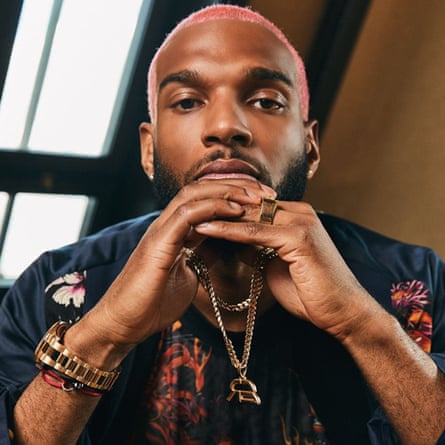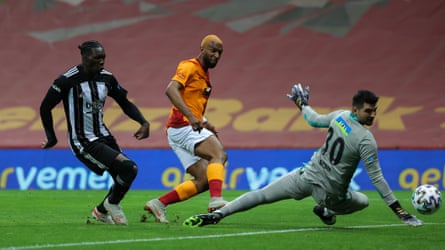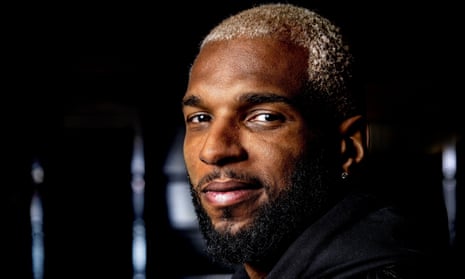Ryan Babel releases his autobiography on Friday. Nothing extraordinary in that, you might think; he is 34 and in the final stages of an eventful career, after all. But this autobiography is an eight-track rap album written and performed by the former Liverpool forward. “The whole point was to try to do something different, something creative and something that hasn’t been done before,” says Babel. As with the best autobiographies, it does not hold back.
“I was inspired to do it,” explains Babel, who is in Amsterdam to promote The Autobiography – Chapter 1 and an accompanying short film during time off from Galatasaray in the international break. “When I was back at Ajax a little under two years ago a journalist approached me and asked if I was willing to start the process of writing an autobiography. My feeling was it was a little too early. I wasn’t ready. But then we went into the first lockdown and had to stay at home and I got bored. And that’s where the idea came from. I thought: ‘Why don’t I take the concept of the autobiography in music format?’ So I called a few music friends here in Holland to see how busy they were and explained the concept. They were very excited to help me and that’s how the journey started.”

Friends in the music industry were not hard to find. Babel has been immersed in music since he was a teenager and wanted to pursue a dual career in rap and football while graduating through the ranks at Ajax. That was discouraged, he says, by “general public opinion, the football media. At that time it was not as common as it is today for football players to do it. I was one of the only football players here who was doing that and I felt intimidated by these opinions. I was 18, 19 years old and so I thought I should take a step back and not get involved in the forefront of the music side so much.”
He established a music management company instead, 12 years ago, and has appeared on songs by other Dutch hip-hop artists. Writing and producing eight songs about his own life, however, brought a different challenge.
The Netherlands international admits: “I was aware that, if I wanted to make it authentic, I had to share stuff that maybe isn’t always comfortable to tell. But at the same time I was prepared mentally to do that and the process of writing was very inspiring with the people who were involved. I’m really proud of what I was able to tell in the final product and the way I was able to tell it. In the past when I was making little things in the studio it was more like bragging, you know how rappers do in general. It’s easy to lie and say, ‘Oh, I’m rich this and rich that’ but that wasn’t interesting for me and definitely not what I wanted to do. I wanted to be as authentic as possible and share my truth.”
Babel has released two singles from the album so far – Young Champ and Reminder. A third, Open Letter, caused a stir in the Netherlands for criticising his former international teammate Ibrahim Afellay. Former coaches, and the racist abuse that Bukayo Saka, Marcus Rashford and Jadon Sancho were subjected to after the Euro 2020 final, are also addressed.
“Open Letter is a song that is divided into two parts and has two different beats,” Babel says. “The first part of the song is basically me taking you back on a journey I have walked from the very start. I describe moments where I felt certain coaches didn’t believe enough in me. I describe conversations with old football players like Winston Bogarde, who had a tough conversation with me and told me that if I wanted to make it I needed to step it up. I involve the current head coach of the Netherlands, Louis van Gaal, who at the time was the sporting director of Ajax and didn’t believe enough in me to give me a contract but still did because the coach, Danny Blind, believed in me. I talk about those things that happened back in 2003-2004 and I have never shared before.
“There is also a moment where I describe my little relationship with Rafa Benítez at Liverpool, and then you go to the second part of the song which is more about the current time and where I give my opinion on journalism in Holland and a situation with an old colleague who became a journalist [Afellay]. People in Holland took it as a diss-song but it was more an expression of my disappointment in this individual because we had been teammates for so long and now he turned into a pundit who, in my opinion, tried to score points to make his position look good in the pundit world.
“I also rap about a piece of racism by describing what happened to those English players after the Euros final and use a nice metaphor to translate it back to Holland. I say I was not surprised at what happened because we are dealing with the same issues here in Holland. For me it was nothing new.”
Babel’s description of a “little” relationship with Benítez is revealing. The forward was one of the most coveted young talents in Europe when Liverpool bought him for £11.5m in 2007. He was 20 and went on to make more appearances for Liverpool than he has for any other club in a career that also includes Hoffenheim, Kasimpasa, Al Ain, Deportivo La Coruña, Besiktas and Fulham. But the Anfield chapter is one with regrets.
“It was, in my opinion, a weird relationship [with Benítez] because when he signed me I looked at him as the big uncle who wanted to give me a chance and help me succeed. But then as we went on he left me totally on my own and only judged me for the things I didn’t do right instead of telling me how to solve or improve the things I had to improve. I was very young and I just needed guidance. I don’t want to blame the coach for me not having the ultimate career at Liverpool but I felt it could have been closer in terms of guidance and support. You can compare it to when you’re trying to teach someone something and it doesn’t stick, but then someone else says the same thing in a different way and all of a sudden it clicks. The way the coach at that moment tried to make things click, it didn’t click.
“I felt he didn’t put in enough effort to guide a young player, not like you would see today with a Jürgen Klopp or many other coaches who take the time to get the best out of a talent. At that time I was one of the talents in Europe that people had expectations of and unfortunately in a lot of people’s eyes I didn’t fulfil that potential. Now looking back, maybe if I had the right support I could have been much better. That was for me a disappointing spell if you talk about my relationship with the coach. I felt he could have helped me more. Even players like Steven Gerrard and Fernando Torres who were always playing at that time were also confirming that type of relationship [with Benítez].”

He looks at Liverpool with a different perspective now. “I am so jealous! I think it is incredible to be a young player now at Liverpool, especially working under a coach like Jürgen Klopp who tries to get the best out of players and also gives them chances to develop. It is a young player’s dream to have the feeling that a coach actually cares. That can make a real difference for a player.”
Babel is in the final year of his contract with Galatasaray and, despite success in the music and property business, is not contemplating football retirement yet. “I’m open-minded,” he says of the future. “MLS is maybe something I would be interested in. If I still have a team in Europe I could play for I would definitely think about it. I had a great spell at Fulham and made good relationships there, so if Fulham was a place that would make sense at that time I would definitely try to go back to Fulham to help the club with my experience. There have been a lot of ups and downs but in general I am proud of my journey.”
